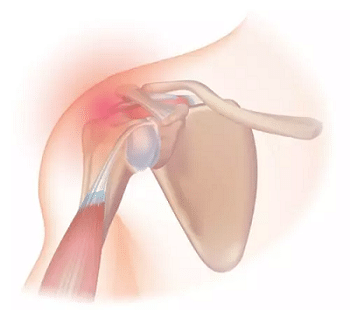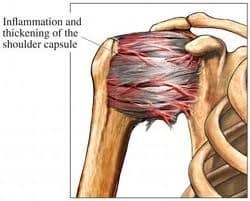
What is Frozen Shoulder?
Frozen shoulder, or adhesive capsulitis, is a condition that results from the gradual loss of movement in the shoulder joint. It is characterized by pain and stiffness that begins gradually, worsening over time and then goes away after 1 to 3 years.
The shoulder joint consists of three bones: humerus, shoulder blade (scapula), and collarbone (clavicle). The joint is surrounded by tissue that holds everything together. The shoulder joint is one of the most mobile joints in the body.
With frozen shoulder, the joint becomes thick and tight making it hard to move. The shoulder motion is limited even more as scar tissue begins to form and the synovial fluid, that keeps the joint lubricated, is secreted in smaller amounts.
Causes of Frozen Shoulder
Although there is not a general consensus as to why this happens to some people, frozen shoulder is more likely to occur in people who have diabetes or those who recently had to immobilize their shoulder for a long period, such as patients recovering after surgery or who suffered an arm fracture.
Conditions such as rotator cuff tendinitis or bursitis that cause Inflammation of the shoulder muscles and/or tendons, can also lead to the shoulder joint to become frozen.
Frozen Shoulder Symptoms
Frozen shoulder typically develops slowly and gradually with most patients experiencing more pain at night, which can make it hard to sleep. People with frozen shoulder typically go through three stages and each stage can last months.

Freezing stage
- This stage can last from 6 to 9 months.
- Starts developing pain in your shoulder when you move it.
- It slowly and gradually gets worse over time and may hurt more at night.
- Your shoulder range of motion is limited.
Frozen stage
- This stage can last from 4 to 12 months.
- As your pain might get better, your stiffness gets worse.
- Moving your shoulder becomes more difficult.
Thawing stage
- This can take from 6 months to 2 years.
- Your shoulder range of motion starts to go back to normal.
Frozen Shoulder Treatment
Since the main two symptoms of frozen shoulder are pain and limited range of motion, the main goal of frozen shoulder treatment is to tackle these 2 issues. To decrease pain, your physician may recommend anti-inflammatory medications such as ibuprofen or aspirin. In some cases, steroid injections of the joint or the bursa may be indicated. To increase/improve motion, your shoulder specialist may recommend physical therapy.
If your symptoms are intense or don’t improve over time with the above mentioned conservative treatments, your doctor might consider surgery. To treat frozen shoulder, surgery is rarely needed or recommended. However, surgery may be evaluated and It likely would be an arthroscopic procedure (a minor surgery performed on an outpatient basis).
